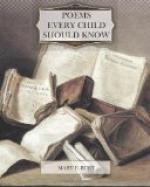And now I see with eye serene
The very pulse of the machine;
A Being breathing thoughtful
breath,
A Traveller between life and
death:
The reason firm, the temperate
will,
Endurance, foresight, strength,
and skill;
A perfect Woman, nobly planned,
To warn, to comfort, and command;
And yet a Spirit still, and
bright,
With something of angelic
light.
WILLIAM WORDSWORTH.
ELEGY WRITTEN IN A COUNTRY CHURCHYARD.
“Elegy Written in a Country Churchyard” (Gray, 1716-71). I once drove from Windsor Castle through Eton, down the long hedge-bound road which passes the estate of William Penn’s descendants to Stoke Pogis, the little churchyard where this poem was written. They were trimming a great yew-tree under which Gray was said to have written this poem. The scene is one of peace and quiet. The “elegy” was a favourite form of poem with the ancients, but Gray is said to have reached the climax among poets in this style of verse. The great line of the poem is:
“The path of glory leads but to the grave.”
It would almost seem that poetry has
for its greatest mission the
lesson of a proper humility.
The curfew tolls the knell of parting
day,
The lowing herd winds slowly o’er the
lea,
The plowman homeward plods his weary way,
And leaves the world to darkness and to me.
Now fades the glimmering landscape
on the sight,
And all the air a solemn stillness holds,
Save where the beetle wheels his droning flight,
And drowsy tinklings lull the distant folds.
Save that from yonder ivy-mantled
tow’r
The moping owl
does to the moon complain
Of such as, wandering near
her secret bow’r,
Molest her ancient
solitary reign.
Beneath those rugged elms,
that yew-tree’s shade,
Where heaves the
turf in many a mould’ring heap,
Each in his narrow cell forever
laid,
The rude Forefathers
of the hamlet sleep.
The breezy call of incense-breathing
morn,
The swallow twitt’ring
from the straw-built shed,
The cock’s shrill clarion,
or the echoing horn,
No more shall
rouse them from their lowly bed.
For them no more the blazing
hearth shall burn,
Or busy housewife
ply her evening care:
No children run to lisp their
sire’s return,
Or climb his knees
the envied kiss to share.
Oft did the harvest to their
sickle yield,
Their furrow oft
the stubborn glebe has broke;
How jocund did they drive
their team afield!
How bow’d
the woods beneath their sturdy stroke!
Let not Ambition mock their
useful toil,
Their homely joys,
and destiny obscure;
Nor Grandeur hear with a disdainful
smile,
The short and
simple annals of the Poor.
The boast of heraldry, the
pomp of pow’r,
And all that beauty,
all that wealth e’er gave,
Await alike th’ inevitable
hour.
The paths of glory
lead but to the grave.




